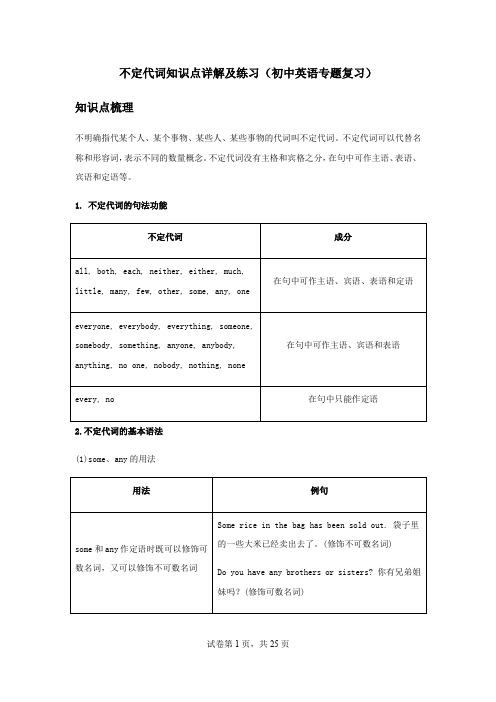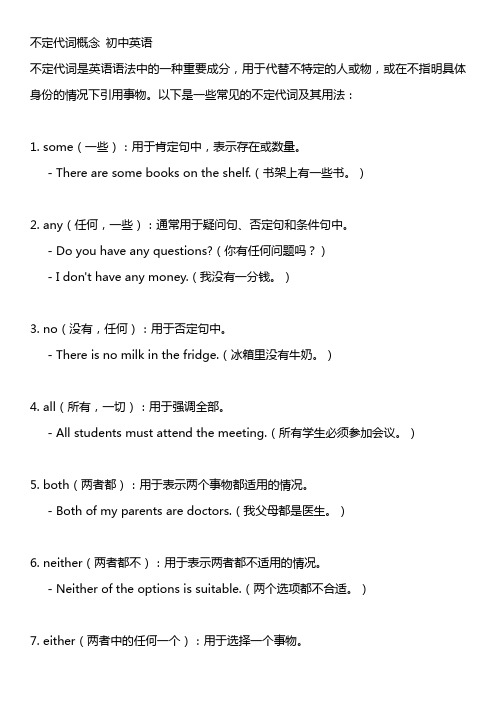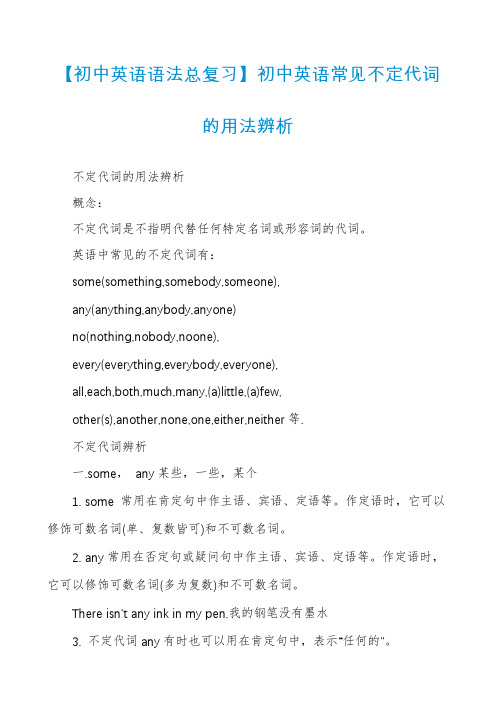初中英语不定代词用法详解
初中英语完整不定代词的用法讲解及练习题(含答案)

不定代词的用法1.some,any(1)some多用于肯定句,修饰复数可数名词和不可数名词,作“一些”解。
它还可修饰单数可数名词,作“某一”解。
如:H-5avian influenza first broke out in some Asian countries.H-5型禽流感首先在亚洲爆发。
Some people are early risers.有些人起得很早。
(2)any通常用于否定句、疑问句或条件句,修饰单数或复数可数名词以及不可数名词。
If there are any new magazines in the library,take some for me.图书馆如果来了新杂志,替我借几本。
Are there any stamps in the drawer?抽屉里有邮票吗?Is there any money with you?你身上带钱了吗?(3)any还可以用于肯定句,作“任何的”解。
You can come here any time.你什么时候来都行。
You can get it at any shop.你可以在任何一家商店买到它。
2.either,both,all(1)either表示“两者中的任何一个”。
Either of the brothers is selfish.两兄弟都非常自私。
Either will do.两个都行。
(2)both“两个都”,修饰可数名词,统指两者。
Tom and Jack both made some progress.汤姆和杰克两个都有所进步。
Both of them should make concessions.他们双方都应做出让步。
(3)all“全部,所有的”,修饰可数名词和不可数名词,指两个以上的人或物。
All the students contributed to the fund.所有的学生都为基金会捐了款。
All of the money has been spent.钱都花完了。
不定代词知识点详解及练习(初中英语专题复习)

Not all books are good.(= All books are not good. 不是所有的书都是好书。
知识拓展:all作主语,指代人时,谓语动词使用复数形式,指代事情时,谓语动词一般使用单数;作同位语时,all在句中的位置与both相同。
(5)复合不定代词的用法
由some,any,every,no与one,body,thing一起构成的代词叫复合不定代词,如something,everybody,anyone,nothing等。由one和body构成的复合不定代词可相互换用。
用法
例句
复合不定代词一般用作单数,在句中作主语、宾语或表语
If you have any questions, please ask me. 如果你有问题,可以问我。
Any child needs love. 任何一个孩子都需要爱。
some和any可以用来修饰单数名词,some表示"某一";any表示"任何的"
Any student can answer this question. 任何学生都可以回答这个问题
some多用于肯定句;在表示请求、劝告、邀请、或不希望对方拒绝的疑问句中用some而不用any
Some of the boys are good at swimming. 一些男孩擅长游泳。
Will you give me some water? 请给我一些水好吗?
any多用于疑问句、否定句和条件状语从句中;用于肯定句中,表示"任何"
little不多,没有什么
知识拓展:
不定代词 初中英语

不定代词概念初中英语不定代词是英语语法中的一种重要成分,用于代替不特定的人或物,或在不指明具体身份的情况下引用事物。
以下是一些常见的不定代词及其用法:1. some(一些):用于肯定句中,表示存在或数量。
- There are some books on the shelf.(书架上有一些书。
)2. any(任何,一些):通常用于疑问句、否定句和条件句中。
- Do you have any questions?(你有任何问题吗?)- I don't have any money.(我没有一分钱。
)3. no(没有,任何):用于否定句中。
- There is no milk in the fridge.(冰箱里没有牛奶。
)4. all(所有,一切):用于强调全部。
- All students must attend the meeting.(所有学生必须参加会议。
)5. both(两者都):用于表示两个事物都适用的情况。
- Both of my parents are doctors.(我父母都是医生。
)6. neither(两者都不):用于表示两者都不适用的情况。
- Neither of the options is suitable.(两个选项都不合适。
)7. either(两者中的任何一个):用于选择一个事物。
- You can take either of the two routes.(你可以选择两条路中的任何一条。
)8. none(没有一个):用于表示一个或多个事物都不存在的情况。
- None of the students passed the test.(没有一个学生通过了考试。
)9. someone(某人):用于指代某个特定的人。
- Someone is knocking on the door.(有人在敲门。
)10. something(某事,某物):用于指代某个特定的事物。
初中英语语法不定代词讲解及习题

初中英语语法不定代词讲解及习题不定代词一、不定代词概述定义不指明代替任何特定名词或形容词的代词some 类something, somebody, someone any 类no 类every 类常见不定代词其他all, each, both, none, one, much, many, (a)few, (a)little, either, neither, other, another 不定代词充当成分作主语、宾语、表语、定语等二、常见不定代词的基本用法1、some 和any: 都是“一些”的意思,都可与可数名词复数或不可数名词连用。
(1)some 一般用于肯定句中,any 一般用于否定句或疑问句中。
Eg. ___________________________________________________________ ___________________________________________________________(2)在表示请求、建议或希望得到肯定回答的疑问句中,应该用some 而不用any 。
Eg. Would you please give me some paper?___________________________________________________________(3)当any 表示“任何”或“无论哪一个”的意义时,可以用于肯定句,此时any 要重读。
Eg. You may come at any time that is convenient to you.___________________________________________________________2、表示数量的不定代词(1)many______, few_______, a few_______, 用以代替或修饰可数名词。
(2)much______, little_______, a little________,用以代替或修饰不可数名词。
【初中英语语法总复习】初中英语常见不定代词的用法辨析

【初中英语语法总复习】初中英语常见不定代词的用法辨析不定代词的用法辨析概念:不定代词是不指明代替任何特定名词或形容词的代词。
英语中常见的不定代词有:some(something,somebody,someone),any(anything,anybody,anyone)no(nothing,nobody,noone),every(everything,everybody,everyone),all,each,both,much,many,(a)little,(a)few,other(s),another,none,one,either,neither等.不定代词辨析一.some,any某些,一些,某个1. some 常用在肯定句中作主语、宾语、定语等。
作定语时,它可以修饰可数名词(单、复数皆可)和不可数名词。
2. any常用在否定句或疑问句中作主语、宾语、定语等。
作定语时,它可以修饰可数名词(多为复数)和不可数名词。
There isn’t any ink in my pen.我的钢笔没有墨水3. 不定代词any有时也可以用在肯定句中,表示“任何的"。
you may e at any time.你任何时候来都行.4. some 用于疑问句时,表示建议、请求或希望得到肯定回答。
如:Would you like some coffee with sugar?(你要加糖的咖啡吗?)二.little, few1. a few /few +名词复数,a little /little +不可数名词,afew /a little 表肯定,(一点/一些),few / little 表否定(几乎没有) a little salt/little salt一点盐/没有多少盐a few people/few people有几个人/没有几个人2. a little +不可数名词= a bit of + 不可数名词,译为“一点”alittle +形容词=abit +形容词,译为“有点”a little water= a bit of water 一点水a little tired = a bit tired 有点累三.表许多1. alot of与lotsof同义,其后可以接可数名词复数或不可数名词2. many之后只能接可数名词复数3. Much之后只能接不可数名词四.both, all1. both两者都2. all三者或以上都五.either,neither,none1. either二者中任意一个2. neither两者都不3. none三者或以上都不六.any, every1.any 指任何一个,强调部分.2.every 指每一个,强调整体.七.each,every1. each 两者以上中每一个,可以做主语,宾语和定语,可以和of 连用。
初中英语---不定代词用法辨析与例题分析

⑤any 用于肯定陈述句或条件状语从句中时,意为“任何的,任何一个的”, 其后接名词单数形式。如:
You can take any book. They are all yours. // If you have any quention, please let me know.
Jim can run faster than any other student in his class.
or that one? ---- Both.
③all和both既可以修饰名词(all/both+(the)+名词),也可 以独立使用,采用“all/both + of the +名词(复数)”的形式, 其中的of 可以省略。如:All (of) (the) boys are naughty.
⒋ every和each的用法辨析: ①every是形容词,只能作定语修饰单数名词,意思是“每一个”,表示整
⑤the others表示特指某范围内的“其余的人/物”,(指全部)。如: Two of the ten boys are standing and the others are sitting round them.
⒎ all和every的用法辨析: all和every都表示“全部、所有的”等概念。all后的谓语动词多用复数 形式,而every后的谓语动词用第三人称单数形式。如:All students study hard in my class. // Every student studies hard in my class.
⒑ one、ones、that 和it的用法辨析: ①one代替上文提过的同类事物或人中的任何一个,表示泛指。如: I can’t find my hat. I think I must buy one. (不定) He has lost his bike. He wants to buy a new one. 他弄丢了自行车,他想
(完整)初中英语语法不定代词讲义

不定代词一、不定代词的定义:不指明代替任何特定名词或形容词的代词叫做不定代词。
不定代词在句中可以作主语、宾语、表语或定语等。
不定代词可以分为一般不定代词和复合不定代词。
二、一般不定代词及用法1. some/any 含义:“一些”,既可以修饰可数名词,也可以修饰不可数名词。
区别:1). some用于陈肯句;any用于疑问句或否定句。
I can see some flowers, but I can`t see any apples.2). some 用在疑问句中有表示请求或建议的功能;any用在肯定句中有强调或加强语气的功能,意为“任何”。
Would you like some coffee?You may come at any time.2. many/much注意:“many”和“much”前可有so, too等词进行修饰。
There are too many mistakes in your diary. So many people are waiting for the bus.Sorry, I’m afraid I can’t go with you. I’ve got too much work to do.3. few/a few/little/a littleHe has a few friends.他有几个朋友。
He has few friends. 他几乎没有朋友。
We still have a little time. There is little time left.4. both, either, neither, all, every, none5. “other” 、“another”、“others”和“the others”I have two pencils. One is yellow, the other is red.I don’t like this green pencil, please give me another one.In our class, some students like playing football, others like playing basketball.There are seven people in Running Man. One is a woman, and the others are men.三、复合不定代词及用法1. 复合不定代词的构成:复合不定代词是由some-,any-,no-,every-加上-one,-body,-thing 所组成的不定代词。
初中英语-不定代词的用法总(共31张PPT)PPT教学课件

2020/12/11
8
▪ 二、 复合不定代词的用法
▪ 1. 不定代词some, any, no与-one, -body, thing可以组成九个复合代词。它们是:
▪ someone anyone
no one
▪ somebody
anybody nobody
▪ something
于表示人,它们的形式是单数形式,但有时 可以用they或them指代。如:
▪ There is someone in your office. Can you hear them talking?
▪ 你办公室里有人。你听见他们说话了吗? ▪ them指代someone
▪ No one was kinder to me at that time than Rose.
不定代词的用法总结
▪ 英语中,不指明代替任何特定名词或形容 词的代词叫做不定代词。一般有以下几组:
▪ 1) some, any, no
▪ 2) somebody, anybody, nobody ▪ someone, anyone, no one (注意不要
连写)
▪ something, anything, nothing
▪ 那时,没有一个人比Rose对我更好。
2020/12/11
11
▪ 4. 第二部分为-thing的复合代词只能用于指物。 如:
▪ There was something wrong with the car so he had to stopped it.
▪ Why don’t you say something to me?
▪ He looked at me and didn’t say anything.
- 1、下载文档前请自行甄别文档内容的完整性,平台不提供额外的编辑、内容补充、找答案等附加服务。
- 2、"仅部分预览"的文档,不可在线预览部分如存在完整性等问题,可反馈申请退款(可完整预览的文档不适用该条件!)。
- 3、如文档侵犯您的权益,请联系客服反馈,我们会尽快为您处理(人工客服工作时间:9:00-18:30)。
不定代词用法详解不定代词,不明确指代某个特定的人或事物的代词叫不定代词。
不定代词可以代替名次和形容词,表示不同的数量概念。
不定代词没有主格和宾格之分,在句中可做主语、宾语、表语、定语等。
英语中的不定代词常常成对出现,如some 和any, all 和both, neither 和either, each 和every, other 和another, much 和many, one 和no, none和no one, few 和a few,little 和a little,等等。
另外,还有由some, any, every, no 与body, one, thing构成的复合不定代词(somebody, anybody, everybody, nobody, someone, anyone, everyone, no one, something, anything, everything, nothing)。
1. some 和anysome 和any都可修饰或指代可数名词和不可数名词;some 一般用于肯定句,any一般用于疑问句和否定句。
如:I must get some fruit in the market. 我得在市场上买点水果。
Do you have any books for children? 你有适合小孩子看的书吗?【说明】(1) 当表示请求或要求并希望对方能给出肯定的回答时,some 也可用于疑问句;any 表示“任何的”之意时,也可用于肯定句。
Can you give me some paper? 你能给我些纸吗?Why not send that girl some flowers? 为什么不送给那位女孩几束花呢?You can read any of the books. 你可以看这些书中的任何一本。
(2) some 和any均不能跟冠词连用。
2. all 和both(1) all表示全部,表示三者或三者以上的人或物;both指代两个人或事物,表示两者都。
Copper and silver are both metals. 铜和银都是金属。
Both sides are keen to reach an agreement. 双方都很想达成协议。
She and her husband both like dancing. 她和丈夫都喜欢跳舞。
There are trees on both sides of the street. 街道两旁都有树。
Not all women like the word Ms. 并非所有的女性都喜欢Ms这个词。
(2)all 和both都可以与定冠词连用,置于定冠词之前。
Are all the students here today? 今天所有的学生都到了吗?【说明】在句子中用作同位语时,一般放在行为动词之前,情态动词、系动词be或助动词之后,但当行为动词或表语省略时,all, both放在情态动词、系动词be或助动词之前。
They haven’t been there, but we both have. 我们没有去过那儿,但我们俩去过。
(3)All,both与not连用表示部分否定。
All birds can not fly. 不是所有的鸟都会飞。
All that glitters is not gold. 并不是所有发光的都是金子。
Both men and women are not of the same character. 男人和女人的性格特点不都一样。
3. neither 和eitherneither 和either 均用于指两者,neither 意为“两者都不”,either意为“两者之一”、“任意一方”。
如:Neither of us enjoy getting up early. 我们俩谁也不喜欢早起。
There are trees on either side of the street. 街道两边都有树。
She’s the kind of person you either love or hate. 她是那种叫你不是爱就是恨的人。
Here are two shirts ,you can take either of them. 这儿有两件衬衫,你拿哪件都可以。
I agree with neither of you. 你们两人的意见我都不同意。
【说明】(1)只用于指两者,指三者或多者要用none 和any。
(2) neither 有时可视为either 的否定式,即neither= not either。
(3) 两者均可修饰名词,但被修饰名词要用单数形式。
4. each 和every(1)each 强调个体,指两者或两者以上的人或物,在句子中可用作主语、宾语,也可做定语(修饰单数可数名词);every强调全体,只能指三者或三者以上的人或物,在句子中只能做定语,修饰单数可数名词。
Each has something to say. 每个人都有话要讲。
Each child was given a Christmas gift. 每个孩子都得到了圣诞礼物。
You should give 20 dollars to each. 你应该给每个人20美元。
Every minute is important to us. 每一分钟对我们都是重要的。
I read English every morning. 我每天早晨读英语。
(2)each of后面直接接人称代词复数(us,them,you),不能直接接名词,必须在复数名词前加限定词(the或my,his,her,our等物主代词)Each of us has got something to say.Each of my sisters has a storybook.(3) 两个用and 连接的名词若受each或every修饰且用作主语时,其谓语依然用单数。
如:Every [Each] boy and girl has one. 每个男孩和女孩都有一个。
但是,each 用于复数主语后作同位语,后面的谓语用复数。
如:The students each have a dictionary. 学生每人有一本字典。
(4) every 后接“数字或few +名词”可表示“每……”,而each 一般这样用。
如:He comes home every two weeks. 他每隔两周回家一次。
注意:(1) each 指两者或两者以上的“每个”,every 指三者或三者以上“每个”,因此指两者时只能用each。
如:He could write with either hand. 他两只手都能写字。
(2) every 可受almost, nearly 等副词的修饰,但each 却不能。
5. one, another(1) one 指一个或相似的一个;another指另外的一个,表泛指。
如:Please give me another. 请给我另一个。
I haven’t a book; can you lend me one? 我没有书,你能借我一本吗? 【说明】another 可以修饰one,但one 不能修饰another。
如:Please give me another one. 请给我另一个。
(2) one 可与this, that, the 等连用,表示特指;another不能与这些词连用,也不能表示特指。
如:This one is better than the one over there. 这个比那边的那个好些。
(3) 在一定范围内,表示其中的一个用one,表示另一个可用one或another。
如:One boy was reading; one [another] was writing. 一个男孩在读书,另一个在写字。
注意:若指两者中的一个和另一个,则用one…the other。
6. other, the other, others, the others(1) 带定冠词的the other, the others 表特指,而不带定冠词的other, others 表泛指。
如:Don’t cut in when others are talking. 别人说话时别插话。
Only Jim was there. The others had left. 只有吉姆在那儿,其余的人都离开了。
(2) other 和the other 后可修饰名词,也可单独使用;而others 和the others 则只能单独使用,不能修饰名词。
如可说the other people,但不能说the others people。
(3)other 和the other 既可表示单数也可表示复数,具体视它所表代替或修饰名词的单复数而定,而others 和the others 则永远表示复数。
(4)注意正确理解以下短语的意思:every other 每隔一……,其他的……都none other than 不是别的,正是……no other than 不是别的,正是……one after the other 一个接一个地,相继one from the other 分别,各别some . . . or other 某一个other than 不同于,除了the other day 早几天,几天前7. much和manymuch 修饰或指代不可数名词,many修饰或指代可数名词(复数)。
His name is familiar to many people. 他的名字许多人熟悉。
The children have too much homework to do. 孩子们家庭作业太多。
【说明】many 的以下用法应需注意:(1) a great many 许多(后接可数名词的复数)。
(2) many a 后接单数可数名词,相于many后接复数名词,如manya time=many times(许多次)。
8. none和no one(1) none后指人或物,其后通常接表示范围的of短语;no one 通常只用于指人,不用于指物,且其后习惯上接表示范围的of短语。
(2) no one用作主语时,谓语动词用单数;none用作主语时,若指不可数名词,谓语用单数,若指可数名词,则谓语可用单数(较正式)也可用复数(用于非正式文体,但更符合惯用法)。
No one [=Nobody] likes it. 没人喜欢它。
None of the books is [are] interesting. 没有一本书有趣。
